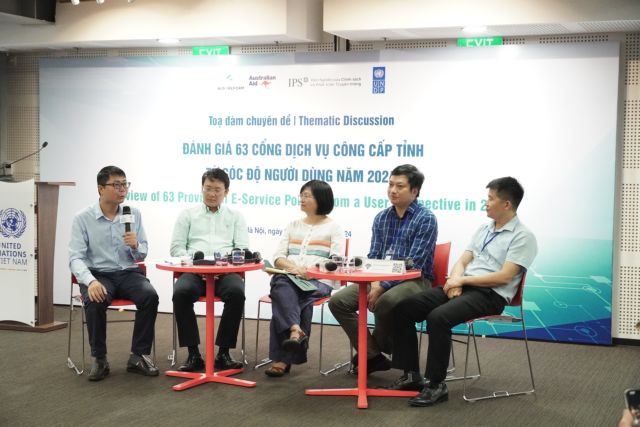 |
| Experts discuss this year’s review of provincial e-service portals across the country at the event on Wednesday. — Photo courtesy of United Nations Development Programme (UNDP) in Việt Nam |
HÀ NỘI — This year’s evaluation of 63 provincial e-service portals (PESPs) shows improvement in the provision of online public administrative services (OPASs) compared to the 2023 findings, according to experts.
They were responding to the review of 63 public service portals from a user point of view, at an event jointly hosted by the United Nations Development Programme (UNDP) in Việt Nam and the Institute for Policy Studies and Media Development (IPS) on Wednesday, marking the second year the IPS has undertaken such a review.
Many PESPs performed well in the evaluation criteria of ‘Providing supporting information’ and ‘Ease of use of lookup tools’, however, there remains significant room for improvement in terms of convenience, user-friendliness and accessibility.
In his opening remarks, Nguyễn Minh Hồng, chairman of the Việt Nam Digital Communications Association, highlighted that in the context of the rapidly developing digital government, PESPs play a crucial role in connecting the government authorities with citizens and businesses.
Although there have been many improvements since 2021, the rate of online applications still falls short of expectations and service quality remains limited.
Hồng said: “Evaluating public service portals from the user’s perspective is extremely important to ensure that digital transformation meets the needs and expectations of the public.”
According to the evaluation results, overall, PESPs have not served users effectively and have yet to achieve the primary goal of providing convenience for users in performing administrative procedures. Most users must rely on direct guidance or assistance from civil servants at one-stop shops.
“The good news is that, compared to 2023, more provincial e-service websites are now accessible to persons with disabilities,” said UNDP Resident Representative Ramla Khalidi.
“However, there is still substantial room to make e-services more convenient, more user-friendly and more accessible to all. The assessment has provided valuable insights on how to improve accessibility and usability for citizens, particularly those at risk of being left behind in the digital transformation.
“I hope that provincial authorities will find the recommendations useful and actionable. As more disadvantaged citizens and underserved communities gain access to online public administrative services, Việt Nam will become a more inclusive society,” she added.
There are key reasons explaining why PESPs have been rated low in their performance. Users have still struggled with varying interfaces and implementation methods on PESPs in a single session due to the lack of links between them and the National E-Service Portal or with ministries’ ESPs.
Additionally, the administrative procedure handling process is not fully transparent or presented in a clear and easily accessible manner and cannot be tracked on the PESPs, making it difficult for users to understand the necessary steps for using PESPs and to monitor the progress of their applications.
The research results indicate that up to 60 PESPs did not meet the ‘Personal data protection and privacy’ criterion and 39 PESPs did not meet the ‘Access for people with disabilities’ criterion.
Most PESPs were at the average level in terms of compatibility with both computers and smartphones. None of 63 PESPs have attained more than 50 per cent of the evaluation criteria at a ‘good’ level. Additionally, the differences between PESPs’ evaluation scores are minimal.
However, these issues are only the tip of the iceberg in the provision of online public administrative services. One of the roots of these shortcomings and challenges is the complexity of the public administrative processes and procedures, which are unsuitable for online services.
Meanwhile, OPASs on PESPs are still processed based on the administrative processes and procedures being applied for traditional, in-person interactions.
Furthermore, the technical infrastructure in many localities has limitations, the digital competency of public officials, civil servants and public employees across different government levels is inconsistent and support measures for performing OPASs are not yet effective, all of which are also significant challenges to the widespread implementation of PESPs.
To enhance the effectiveness of PESPs and thereby improve the delivery of OPASs, the report has provided recommendations ranging from specific actions to the digital-first approach, with a user-centric focus.
First and foremost, provinces should conduct self-reviews of their OPAS platforms. The effectiveness, quality, transparency, and publicity of information on the OPAS should be ensured to improve user-friendliness, particularly for ethnic minorities and people with disabilities.
Financial resources need to be diversified for OPAS delivery, the OPAS capacity of public officials, civil servants and public employees should be enhanced and public awareness of PESPs should be increased.
However, the most important aspect is embracing a digital-first approach, focusing on developing OPAS policies from a digital governance mindset, which emphasises natural interaction in the digital environment between service providers and users.
Leveraging digital technology, connecting digital data must be implemented flexibly to eliminate geographical administrative barriers while ensuring effective data sharing and data integration.
Legal documents related to administrative procedures need to be revised to better align with the digital environment. The implementation of administrative procedures that are not bound by administrative boundaries should also be prioritised, the event was told. — VNS
- Reduce Hair Loss with PURA D’OR Gold Label Shampoo
- Castor Oil Has Made a “Huge” Difference With Hair and Brow Growth
- Excessive hair loss in men: Signs of illness that cannot be subjective
- Dịch Vụ SEO Website ở Los Angeles, CA: đưa trang web doanh nghiệp bạn lên top Google
- Nails Salon Sierra Madre
 VnExpress News The News Gateway of Vietnam
VnExpress News The News Gateway of Vietnam





